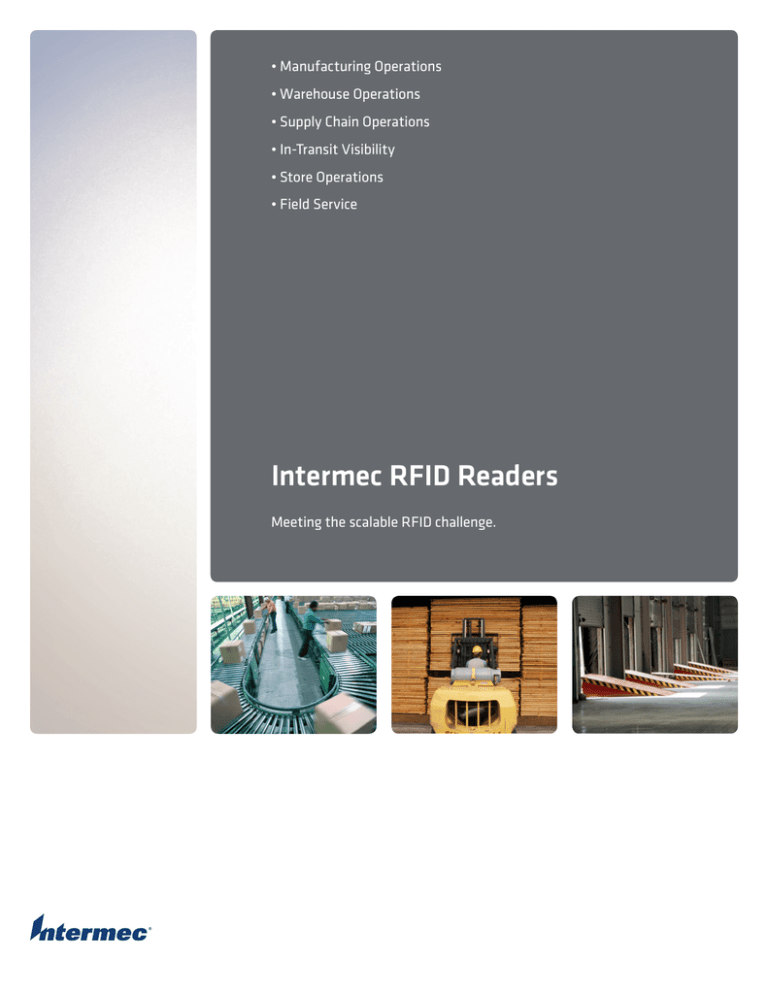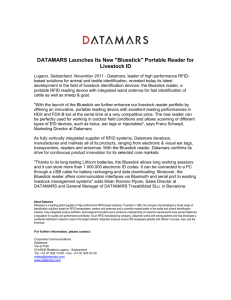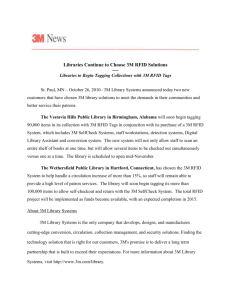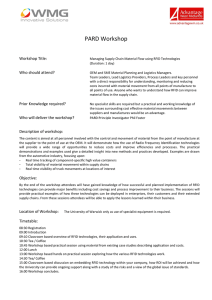
• Manufacturing Operations
• Warehouse Operations
• Supply Chain Operations
• In-Transit Visibility
• Store Operations
• Field Service
Intermec RFID Readers
Meeting the scalable RFID challenge.
How To Determine Which Reader is Right For You
Not all readers are created equal, and for good reason. The application, along with the information demands
of your enterprise data systems, plays the biggest roles in determining the type of reader you need.
Your application may dictate the use of a sophisticated RFID reader capable of controlling peripheral devices based on data read from the
tag, or you may need to attach your RFID reader to a separate local server or a programmable logic controller for local decision making.
The questions below have “either/or” options that can help you determine whether you need a simple reader or a smart reader.
1. Will filtering of redundant tag data need to be performed at the reader level (smart) or by a server or host (simple)?
2. Are Industrial PCs or PLCs currently used (simple) or will local decision making need to be handled by the reader (smart)?
3. Do you need integration of business processes at the point of activity to minimize RFID integration without disruption to existing
business process and backend systems (smart). Or, are you modifying your backend system to accommodate new RFID business
processes (simple)?
4. Will manipulating the tag data format need to be performed at the reader level (smart) or by a server or host (simple)?
Readers: Simple versus Smart
With a primary function of collecting and passing on tag
data, simple readers rely on a host system “up stream” for
decision making. In deployments with access to a reliable,
secure internal network, simple readers like the IF2 Network
Reader may be the “smarter”, most cost effective approach
for passing RFID data onto middleware or other network
applications. However, smart readers like the IF61 Enterprise
Reader can solve some critical requirements and improve
the RFID solution’s ROI in certain deployment models.
Applications requiring storage of data at the reader for
added performance and an additional layer of reliability
Most networked RFID applications are dependent on a reliable
network to immediately pass the tag data to another network
application to complete the transaction. In many industrial
or harsh environments, network availability is inherently
poor. Smart readers have the capability to store and forward
the data either at specified intervals or once the network is
restored. Additionally, a smart reader can be used for a fully
closed-loop solution without the need to connect the reader
to the enterprise network. Such a solution is not only cost
effective, but processing the data right on the reader reduces
or eliminates network security requirements and concerns.
Process Control applications requiring transaction
processing close to the read points
An important metric in many applications is transactions-persecond. RFID readers are not only expected to communicate with
multiple tags nearly simultaneously, but the system solution needs
to react to the incoming data and process a full transaction with
nearly the same performance as reading the raw tag data. Many
transactions, such as those that include database authentication,
require little or no latency in order to complete a response to the
immediate tags being read, such as notifying an operator that
a person or item has not been validated to pass the RFID check
point. A smart reader with intelligence at the edge of the network
may have advantages for such mission-critical applications.
Cost-effective, scalable multiple reader deployments
A simple reader provides a cost effective solution when a local
controller or network host is part of the solution. The low
price per performance of a simple reader improves the ROI
and enables scalable deployments. Smart readers can host
distributed applications, empowering customers to deploy
RFID without an expensive, stand-alone middleware computer
or separate controller device for each RFID reader or each
physical location. To maximize the complete RFID solution’s
ROI, a smart reader can be used as a processing hub for simple
RFID readers that do not have edge processing capabilities.
RFID Reader Options by Application
Application
IF61
IF2
Conveyor
Item and case-level
•
•
Dock Door or Portal
Case and pallet-level
•
•
Stretch Wrap Station
Item and case-level, pallet association
•
•
Overhead Reading
Bulky single items and pallets-level
•
•
Handheld Reading
Item, case and pallet-level
70 Series RFID
•
IP30
IV7
•
Forklift / Vehicle Mounted
Case and pallet-level, location
•
RFID Reader Feature Comparison
Feature
70 Series RFID
IP30
IF2
IV7
•
•
•
EPC LLRP support
•
•
Intermec Advanced RFID
Extensions (ARX) Support
•
•
Additional memory options
•
Linux platform for Java, JavaScript,
C#.NET and VB.NET applications
•
•
Intermec Basic Reader Interface (BRI) support
Wi-Fi (802.11) fixed reader option
or on handheld computer
IF61
•
Wireless WAN (cellular) option
on handheld computer
•
•
•
•
Ethernet support
•
Power over Ethernet (PoE)
•
Serial (RS-232) API support
•
Internal power supply
•
4 antenna ports
•
•
•
•
•
Forklift mounting option
•
•
Handheld computer snap-on
Multi-regional options
•
•
Bi-static antenna operation
Integrated feature of handheld computer
•
•
•
•
•
•
Intermec RFID Readers
IF61 Enterprise RFID Reader
The Intermec™ IF61 Enterprise Reader is the most powerful combination of
reader and network appliance for running RFID applications, delivering faster
processing at the edge of the network and faster decision making at the
point of activity. Applications written in Java, JavaScript, VB.NET, or C#.NET
can run on the IF61 enabling it to filter, store and manipulate information
from tags and send to a server in a required format. In addition, it can
monitor external sensors and control audible and visual indicators without
the expense, and potential additional point of failure, of a separate server.
Typical Applications: Dock door scanning and overhead scanning in supply
chain management for retail operations, consumer goods and industrial
manufacturing, and logistics.
Specifications
Dimensions: 12.74” L x 4.25” H x 8.9” W
(32.4 x 10.8 x 22.6 cm)
Operating Temperature:-13° F to 131° F (-25°C to 55°C)
Frequency Ranges: 865 or 915 MHz band
Connectivity: Ethernet 10/100 BaseT,
optional 802.11a/b/g Tag Air Interfaces EPCglobal
UHF Gen 2, ISO 18000-6B, ISO 18000-6C
Certifications: Multiple regions
Environmental Protection: IP54
Shock and Vibration Protection: Meets or
exceeds MIL-PRF-28800F, Class 2
IF2 Network RFID Reader
The IF2 is a compact, cost-effective network reader designed to support
diverse passive UHF RFID applications in both enterprise and industrial
environments. The IF2 supports Power over Ethernet, four mono- or
bi-static RF ports, built-in powered general purpose input output (GPIO)
control, and both standards-based LLRP and Intermec's easy to use
Basic Radio Interface (BRI) application interfaces, enabling scalable
low-cost deployments for improved return on investment (ROI). The
IF2 is packaged in a durable enclosure for nearly any environment
and is factory configured to operate in regions across the globe.
Typical Applications: Conveyor scanning, stretch wrap stations,
work-in process monitoring in supply chain management for
retail operations, industrial manufacturing, and logistics.
Specifications
Dimensions: 7.36” L x 1.70” H x 6.42” W x 1.70” H
(18.7 x 4.3 x 16.3 cm)
Operating Temperature:
-4 to 122° F (-20 to 50°C)
Frequency Ranges: 865 or 915 MHz band
Tag Air Interfaces EPCglobal UHF Gen 2,
ISO 18000-6B, ISO 18000-6C
Connectivity: 10/100 BaseT Ethernet, RS-232, USB
OTG for configuration, PoE (803.2at) compliant
Certifications: Multiple regions
Environmental Protection: IP53
70 Series RFID
The Intermec 70 Series RFID is the no-compromise, next generation
family of ultra-rugged mobile computers that add passive UHF
reading to the already impressive feature set of 70 Series devices.
Adding RFID capability to 70 Series mobile computers has not come at the
expense of size and weight. A fully integrated design utilizing Intermec’s
IM11 embedded module—along with an internally housed antenna—enables
advanced RFID read performance while maintaining the already-compact
form factor of the 70 Series. The result is a fully integrated mobile platform
that meets or exceeds typical RFID read range requirements, in a design
that is more compact and comfortable to use than competing devices.
Typical Applications: Retail (store operations and item level
inventory), healthcare (asset management), heavy industrial and
heavy asset (oil and gas equipment, cylinder/container/vehicle)
tracking, government (asset and inventory management)
Specifications
CN70 RFID Specifications
Dimensions: 6.65" L x 3.15" W x 1.34" D
(16.9 x 8.0 x 3.4 cm)
Weight: 450 g (15.9 oz) with battery
CN70e RFID Specifications
Dimensions: 7.66" L x 3.15" W x 1.34" D
(19.5 x 8.0 x 3.4 cm)
Weight: 491 g (17.3 oz) with battery
CK70 RFID Specifications
Dimensions: 9.33" L x 3.16" W x 1.69" D
(23.7 x 8.0 x 4.3 cm)
Weight: 562 g (19 oz) with battery
Shared Specifications
Operating Temperature: -4F° F to +140° F
(-20° C to +60° C)
Frequency Range: 902-928 MHz (US/Canada) or
865-868 MHz (EU)
Connectivity: 802.11 a/b/g/n Dual Band WLAN,
Integrated Bluetooth®
Certifications: Multiple regions
Antenna: Internal, orientation insensitive
Environmental Protection: IP67
Drop Specification: 8 ft. (2.4 m) to concrete across
operating temperature range per MIL-STD 810G
IP30 Handheld RFID Reader
The Intermec IP30 add-on passive UHF RFID handle is a cost-effective,
compact, EPCglobal-certified solution for adding mobile RFID read/write
capability to Intermec’s latest generation of mobile computers including
the 70 Series, CN4/CN4e, CN3/CN3e, and CK3B/CK3X. The modularity of
the IP30 and the RFID-readiness of the Intermec mobile computers mean
the power of RFID can be literally added in a snap today or at any point
in the future to support in-premises and in-field applications such as
warehouse operations, enterprise asset management, retail and enterprise
inventory management, field service, and exception handling.
Typical Applications: Mobile RFID scanning for both in-premise and
in-field applications.
Specifications
Weight without handheld computer:
430 g with battery (0.95 lbs)
Weight with CN3 or CN4: 860 g with battery (1.90 lbs)
Weight with CN70 and CK3B: 880 g with battery (1.94 lbs)
Weight with CN70e: 921 g with battery (2.03 lbs)
Weight with CK3X: 929 g with battery (2.05 lbs)
Weight with CK70: 992 g with battery (2.19 lbs)
Weight with CK71: 1.01 kg with battery (2.24 lbs)
Operating Temperature: 5° F to 122° F (-15° C to 50° C)
Frequency Ranges: 865 or 915 MHz band
Air Interface: EPCglobal UHF Gen 2,
ISO 18000-6B, ISO 18000-6C
Connectivity: Bluetooth or USB connection to
mobile computer (computer dependent)
Certifications: Multiple regions
Antenna Polarity: Linear
Environmental Protection: IP64 compliant
IV7 Vehicle Mount RFID Reader
Specifically created for mobile mount applications, the IV7 is designed
for bolt-in attachment to a forklift backrest and serial attachment
to the Intermec CV30 or CV60 vehicle mount computers. Built to
withstand the rigors of harsh industrial environments and sealed
to IP65 ratings, the IV7 delivers the flexibility of “read where you
need” and a cost advantage over portal reader systems wherever the
number of dock doors is larger than the number of fork trucks.
Typical Applications: Pick and put-away, cross-docking, shipping
and receiving.
Specifications
Dimensions: 13.75”L x 3.75”H x 9.3”L
(34.9 x 9.5 x 23.6 cm)
Operating Temperature:
-13°F to 131°F (-25°C to 55°C)
Frequency Ranges: 865 or 915 MHz band
Connectivity: 802.11b/g to network via the
CV30, CV41, or CV61 Fixed Mount Computer,
RS-232 connection to computer
Tag Air Interfaces: EPCglobal UHF Gen 2, ISO
18000-6B, ISO 18000-6C
Certifications: Multiple regions
Environmental Protection: IP65
Shock and Vibration Protection: Meets or
exceeds MIL STD 810F
RFIDeploySM Services for Assured RFID Success
•
•
•
•
Feasibility Analysis
Process Analysis
Site Analysis
Site Installation
Even with standards, RFID is nothing close to being a plugand-play technology. Many enterprises lack the expertise
on staff to handle system design and implementation or to
anticipate the complexi­ties and consequences of the decisions
to be made. With years of experience installing complete
RFID systems around the world, Intermec is committed to
working with companies to make sure each implementation
of RFID tech­nology is successful, today and tomorrow.
The long-term value, return on investment and total cost of
ownership of an RFID system are all heavily dependent on
the initial process design and implementation decisions. A
solid business case, appropriate system architecture, and
equipment that is optimized to satisfy both will provide
the foundation of a successful project. Engaging Intermec
RFIDeploy SM Services early in the process increases the chances
for success. The use of professionals also helps avoid roadblocks
that can prolong implementation and undermine ROI.
Intermec’s RFIDeploy Services help customers by evaluating
RFID technology and integrating it seamlessly into their
business processes. RFIDeploy is a suite of consultative
and site engineering services that combine together to
accomplish a fully integrated RFID system implementation
by virtue of an inter-service feedback process.
These services—Feasibility Analysis, Process Analysis, Site
Analysis, and Site Installation—support the end user with a level
of confidence in his RFID-related business decisions derived
through proof of concept. The process is completed when the
Site Installation tests out the performance level of the system
against success criteria specified in the Process Analysis and
confirmed during the Site Analysis. When RFIDeploy services
are engaged, performance of the RFID system is guaranteed
to meet the criteria for success established in the Process
Analysis for 18 months after hand off to the end user.
North America
Corporate Headquarters
6001 36th Avenue West
Everett, Washington 98203
Phone: (425) 348 2600
Fax: (425) 355 9551
Customer Service
and Support
Toll Free NA: (800) 755 5505
Toll in NA: (425) 356 1799
EMEA: intermec.custhelp.com
North Latin America
Headquarters Office
Mexico
Phone: (+52) 55 52 41 48 00
Fax: (+52) 55 52 11 81 21
South Latin America
Headquarters Office
Brazil
Phone: (+55) 11 3711 6776
Fax: (+55) 11 5502 6780
Europe, Middle East
& Africa
Headquarters Office
Reading, United Kingdom
Phone: (+44) 118 923 0800
Fax: (+44) 118 923 0801
Media Sales
EMEA: (+31) 24 372 3167
USA: (513) 874 5882
http://intermec.custhelp.com
Sales
Toll Free NA: (800) 934 3163
Toll in NA: (425) 348 2726
Freephone ROW:
00800 4488 8844
Internet
www.intermec.com
Worldwide Locations
www.intermec.com/locations
OEM Sales
Phone: (425) 348 2762
Asia Pacific
Headquarters Office
Singapore
Phone: (+65) 6303 2100
Fax: (+65) 6303 2199
Copyright © 2013 Intermec Technologies Corporation. All rights reserved. Intermec is a
registered trademark of Intermec Technologies Corporation. All other trademarks are the
property of their respective owners.
611571-K 05/13
In a continuing effort to improve our products, Intermec Technologies Corporation
reserves the right to change specifications and features without prior notice.



